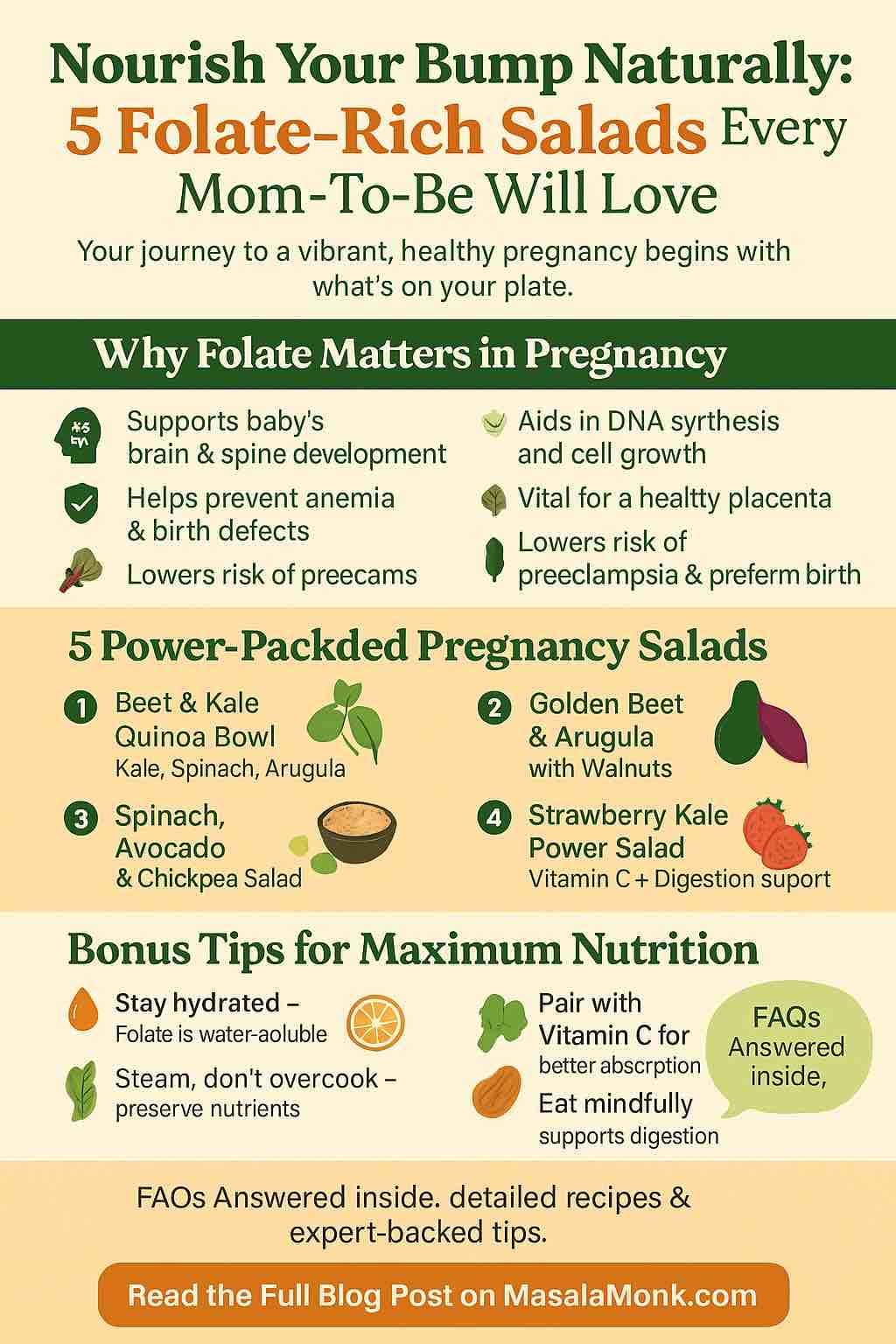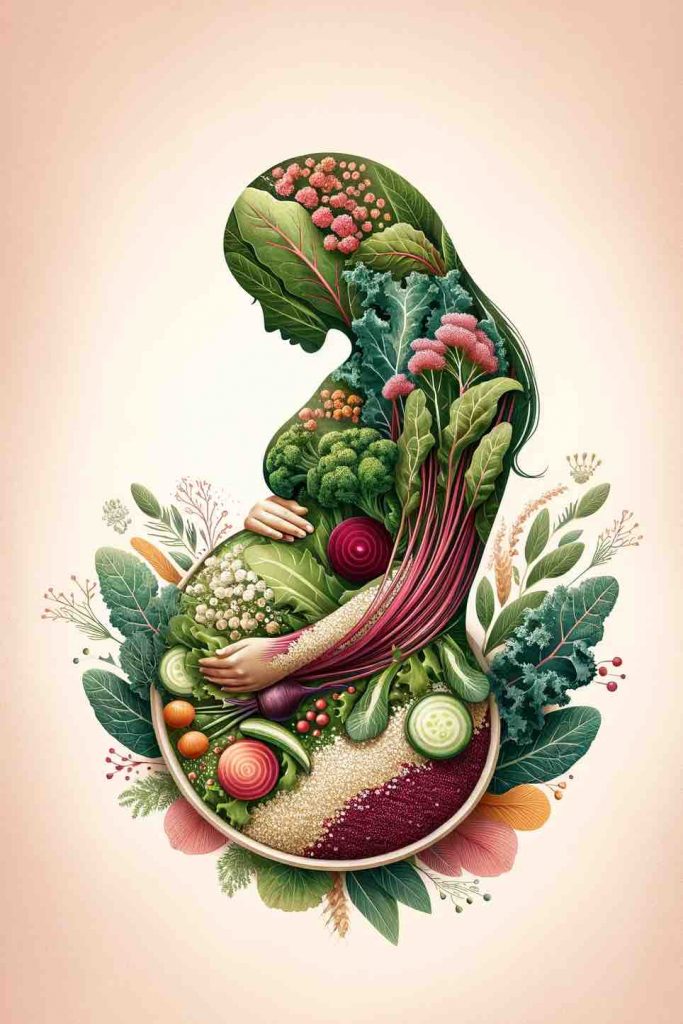
Pregnancy is one of the most nutritionally demanding stages of a woman’s life. Every bite counts—not just for your own wellbeing, but for the healthy development of your baby. Among the many essential nutrients during this phase, folate (vitamin B9) holds a place of special importance.
While most women know they need folic acid supplements, the conversation about natural folate-rich foods often takes a backseat. But food-based folate can be better absorbed, safer for women with MTHFR gene variations, and more sustainable when paired with prenatal care.
In this guide, we focus on five vibrant, nourishing, and easy-to-make folate-rich salads, crafted using kale, quinoa, beets, chickpeas, spinach, and other natural superfoods. These are not just recipes—they’re strategies for supporting a healthy pregnancy using nature’s most potent ingredients.
🌿 Why Folate Is Critical During Pregnancy
Folate plays a fundamental role in:
- 🔄 Cell division and DNA synthesis—necessary for the formation of new tissues.
- 🧠 Neural tube development—folate helps prevent birth defects of the brain and spine like spina bifida.
- 🩸 Red blood cell formation—reducing the risk of anemia.
- 🌱 Placental development—a healthy placenta means better nourishment for your baby.
- 🛡️ Reducing risks—like preterm delivery, low birth weight, and preeclampsia.
📌 Recommended Folate Intake for Pregnant Women
According to leading health bodies including the CDC and WHO:
- Pregnant women need at least 600 micrograms dietary folate equivalents (DFE) per day.
- Folate from food contributes naturally, while supplements (folic acid) help bridge the gap.
While supplementation is often essential (especially in early pregnancy), dietary folate provides a broader nutrient profile and added digestive benefits. That’s why meals built around natural folate sources are invaluable.
🥗 Building Blocks of a Folate-Rich Pregnancy Salad
Creating salads that support folate intake isn’t just about tossing greens in a bowl. Here’s how to build a pregnancy-safe, nutrient-rich salad that’s both enjoyable and functional:
🟢 The Folate-Rich Foundations:
- Dark leafy greens: spinach, kale, arugula, romaine, mustard greens
- Legumes: chickpeas, black beans, lentils, edamame
- Whole grains: quinoa, brown rice, bulgur
- Beets: roasted or steamed, rich in folate and antioxidants
- Seeds & nuts: sunflower seeds, flaxseed, chia, almonds
🔶 Supportive Additions:
- Healthy fats: olive oil, avocado, tahini
- Vitamin C sources: citrus, berries, tomatoes – help absorb plant-based iron
- Protein: eggs, paneer, yogurt, or seeds
Together, these ingredients create nutritionally dense meals that can help meet folate needs naturally while adding fiber, iron, calcium, and essential fatty acids—all crucial in pregnancy.
🥗 5 Power-Packed Folate-Rich Salad Recipes
Each of these recipes is:
- 100% whole food-based
- Designed for flavor, comfort, and digestion during pregnancy
- Easily customizable for any trimester
1️⃣ Roasted Beet & Kale Quinoa Bowl
A vibrant, earthy salad with deep nutritional value.
Ingredients:
- 1 cup chopped kale (massaged with lemon juice)
- 1 small beet, roasted and cubed
- ½ cup cooked quinoa
- ½ cup boiled chickpeas
- 1 tbsp olive oil
- Pinch of sea salt, cumin, and lemon zest
Why it works:
Kale and beets are both loaded with folate, iron, and fiber. Chickpeas contribute additional B-vitamins and protein, while quinoa provides all 9 essential amino acids.
2️⃣ Baby Spinach, Avocado & Chickpea Salad
Soft, soothing, and ideal for nausea-prone mornings.
Ingredients:
- 1 cup baby spinach (raw or lightly wilted)
- ½ avocado, cubed
- ½ cup chickpeas
- 1 tbsp sunflower seeds
- 1 tbsp fresh lime juice
- Pink salt and crushed black pepper
Why it works:
Spinach and chickpeas are top-tier folate sources. Avocado adds folate, potassium, and healthy fats to support fetal brain development.
3️⃣ Golden Beet & Arugula Salad with Walnuts
A sweet-spicy salad with brain-boosting fats.
Ingredients:
- ½ cup arugula
- ½ cup cooked quinoa
- ½ golden beet, grated or thinly sliced
- 1 tbsp walnuts (lightly toasted)
- 1 tbsp olive oil
- Splash of apple cider vinegar
Why it works:
Golden beets offer antioxidants and folate without the earthy taste of red beets. Walnuts support omega-3 needs and cognitive development.
4️⃣ Strawberry Kale Power Salad
Perfect for summer or midday energy slumps.
Ingredients:
- 1 cup kale, finely chopped
- 4–5 strawberries, sliced
- 1 tbsp chia seeds
- 1 tbsp crushed almonds
- Orange juice + olive oil dressing
Why it works:
Strawberries add vitamin C to enhance iron absorption from kale. Chia seeds provide protein, omega-3s, and fiber—all while supporting digestion and reducing inflammation.
5️⃣ Chickpea & Beet Protein Salad
Ideal for batch prep and next-day lunch boxes.
Ingredients:
- ½ cup chickpeas
- ½ beetroot, boiled and cubed
- 2 tbsp chopped parsley
- 1 tsp tahini
- 1 tsp lemon juice
- Cracked pepper
Why it works:
Chickpeas and beets combine to offer over 180 micrograms of folate. Tahini adds calcium and flavor without dairy.

🧘🏽♀️ Additional Tips for Pregnancy Nutrition
To make these salads even more impactful:
- ✅ Pair them with a prenatal supplement for comprehensive coverage.
- ✅ Stay hydrated—folate is water-soluble and needs hydration for effective transport.
- ✅ Prioritize color and variety—each vegetable brings a different spectrum of micronutrients.
- ✅ Use gentle steaming or roasting to preserve the folate in greens and beets.
- ✅ Eat slowly and mindfully—salads are best absorbed when digestion is calm and unhurried.
💬 Invite Yourself to the Table
Folate isn’t just about preventing defects—it’s about creating vitality, energy, and growth for you and your baby. These five salads are not just recipes; they’re daily reminders to care deeply for your body, your future child, and your joy in the process.
Start with one salad. Then try another. Build habits of nourishment, one delicious bowl at a time.
And remember, at MasalaMonk, we’re committed to bringing you wellness backed by flavor, science, and soul.
🙋♀️ 10 FAQs on Folate-Rich Salads & Pregnancy Nutrition
1. What’s the difference between folate and folic acid?
Answer:
Folate is the natural form of vitamin B9 found in foods like leafy greens, legumes, and beets. Folic acid is the synthetic version found in supplements and fortified foods. While both help prevent birth defects, natural folate is often better absorbed and safer for those with MTHFR gene mutations.
2. How much folate do I need daily during pregnancy?
Answer:
Pregnant women should aim for 600 micrograms (µg) of dietary folate equivalents (DFE) per day. This can be met through a mix of food sources and prenatal supplements.
3. Can I rely on food alone for folate intake during pregnancy?
Answer:
It’s difficult to meet the full folate requirement through diet alone. Most healthcare providers recommend continuing a prenatal supplement with folic acid while incorporating folate-rich foods for optimal nutrition.
4. Are raw leafy greens safe during pregnancy?
Answer:
Yes, if they are thoroughly washed to remove soil, bacteria, and pesticides. You can also steam or sauté them lightly to retain nutrients while improving safety and digestibility.
5. What are the best natural food sources of folate?
Answer:
Top folate-rich foods include:
- Leafy greens (spinach, kale, romaine)
- Legumes (chickpeas, lentils)
- Beets
- Avocados
- Broccoli
- Asparagus
- Oranges
- Quinoa
6. How do I boost folate absorption from meals?
Answer:
Combine folate-rich foods with vitamin C sources (like citrus, strawberries, or tomatoes) to enhance absorption. Also, avoid overcooking vegetables, which can deplete folate.
7. Can I eat beets during all stages of pregnancy?
Answer:
Absolutely. Beets are safe and highly nutritious. They support blood flow, reduce inflammation, and provide natural folate and antioxidants—ideal in all trimesters.
8. Are these salads safe for gestational diabetes?
Answer:
Yes—most of these salads are low in glycemic load and high in fiber, which helps stabilize blood sugar. Be sure to monitor portion sizes of quinoa and sweet fruits, and pair with protein or healthy fats.
9. Do MTHFR mutations affect folate needs?
Answer:
Yes. Women with MTHFR gene mutations may not efficiently convert folic acid into active folate. They may benefit from methylated folate (5-MTHF) supplements and folate-rich foods.
10. How can I include these salads in a weekly meal plan?
Answer:
Rotate different salads every few days. Prep ingredients like quinoa, beets, and chickpeas in batches. Store greens separately and assemble fresh for lunch or dinner. These salads can also be eaten as full meals or nourishing sides.









